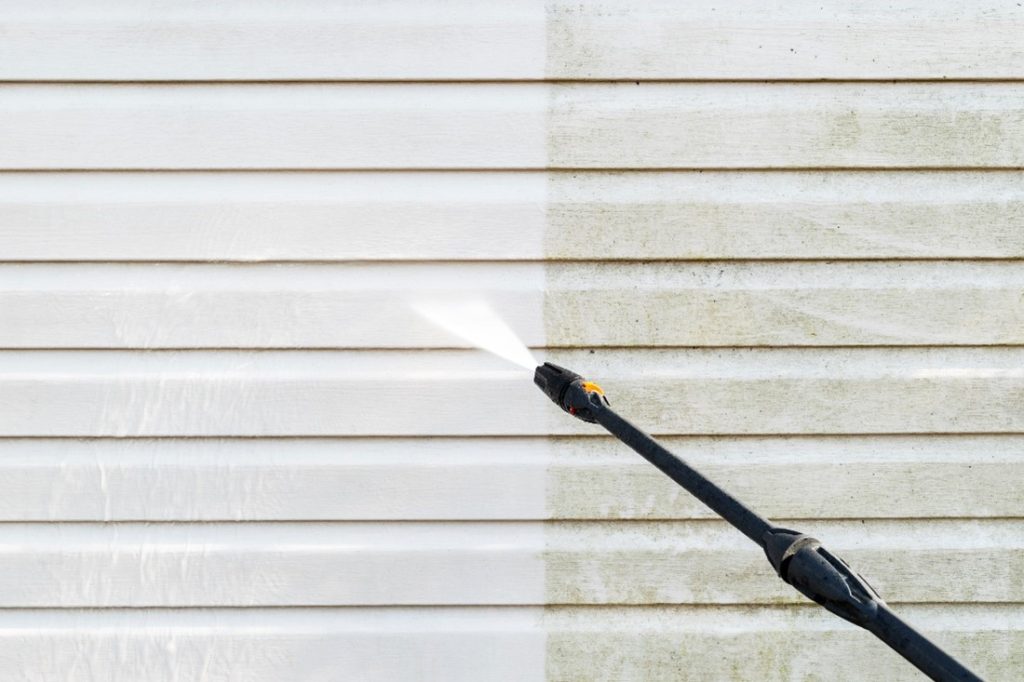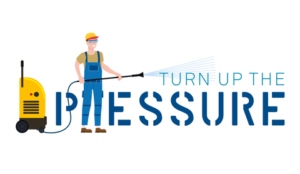
We hear of power washing and pressure washing as they are used all the time as a way to clean things around the house, and work and in other aspects of our life. These two words are used interchangeably, but there actually is a key difference in how they work. Either way they will get the job done but let’s look into what makes them different from one another and how that affects their uses.
The difference between power washing and pressure washing is the temperature of the water. Both options help remove dust and debris from surfaces like concrete and rock, but power washing does so with hot water, and pressure washing does so with regular temperature water.
Each are used in different circumstances and for different reasons. Overall, they will both help you to clean up debris and dirt. It is important to understand where each of these can be used to make the best use of your money, time, and effort.
Power Wash
Power washing is just that, washing something with power. This power is displayed in a steady, uninterrupted stream of blasting hot water. They have the capacity to heat the water up to 200 degrees Fahrenheit. Normally, the machine has a gas-fueled engine or electrical motor that powers a water pump. Power washers heat up the water to around 180 to 200 degrees (ensuring it doesn’t go above 212 and turn to steam). The machine will keep the water warm for about 4 or more hours.
They also pump the water, continuously circulating the system. The restriction of the hose and nozzle at the end of the wand it has creates the pressure. Normally the pressure of the water is between 1000 to 5000 psi.
There are a variety of reasons you would want that kind of pressure and that kind of heat. The offer a little extra force and a greater ability to remove debris because of the high temperature water. Removing stains, muck, mold or other similar materials from walkways, patios, pool decks, or other surfaces is best down with a heated power washer.

This is beneficial because in addition to cleaning the surface and getting all the dirt and grim, it also sterilize it and reduces bacteria because of the extreme heat.
Pressure Wash
Pressure washing is also just as the name calls it, washing with high pressure. They use high-pressure water coming from a pump and hose to blast surfaces and objects clean. It washes away dirt, debris, and dust very quickly.
Essentially pressure washing does exactly what power washing does just without the hot water. The water is not heated, but that does not mean the pressure isn’t very high still. It is great at cleaning surfaces with crevices and grooves.
To truly understand the pressure that comes consider what it can do to some objects. Pressure washing can cut through fingers all the way to the bone. They can crave a pumpkin or take the stain right out a piece of wood. They house incredible power that should be cautioned.
Soft Washing
Another form of pressure washing is called Soft Washing. Soft Washing is a pressure washer that has been modified to a lower PSI (pressure per square inch). Instead of the potential 5000 PSI, soft washers operate at about 500 PSI. The is done by replacing the tip of the pressure washer with one that widens the water spray. Normally, you can add cleaning solutions to the mix in order to sanitize and clean at the same time.
Soft washing is not so harsh on materials and can be used for more places because of this, but will not free it of debris and dirt as well as high pressure washers. It will also not strip the protective coating off your home, and has many eco-friendly options.
Other Types of Pressure Washing
Other than water pressure and there is also steam pressure washing and a combination of both. This can be used for projects that require a higher amount of heat and allow for a deeper clean. It helps to remove more oily substances and also sterilizes. Not only can you do this with just steam pressure, but with a combination washer which uses a mixture of steam and hot water to get off tough stains and grime.
Applications for Power, Pressure, and Soft Washing
Knowing when to use each of the different types of pressure is important. There are a variety of different reasons you could be needed a good solid clean, but as you look into each different type, it is important to understand what you need for your specific project and what dangers are associated with them.
Power Washer
Because of the heated water, these can be used for really tough stains and grime. Often times getting off things like mold and moss will best be removed and sterilized with a power washer. It not only cleans off the surface but helps mold to not grow back and keeps other bacteria at bay. It is also really helpful with salt, mildew and chewing gum. Removing grease from garage floors is also done well with heat.
Because of the hot water and pressure combination, it can also be detrimental to the surface you use it on, if you are not careful and keep a safe distance. Power washing is most safe on concrete surfaces, but if you do use it on another surface be sure to make sure it is not damaging it or removing any protective coatings.
Power washers are most needed for large commercial spaces or larger jobs that require extra cleaning.
Pressure Washer
For everyday household tasks, pressure washers will usually do the job and do it well. The extreme heat is unnecessary if you plan on using it for simple tasks like masonry, brick, and concrete. It can also be used to quickly clean your driveway, roof, patio or deck. It will get dirt our from all crevices and will get rid of most problems and blemishes.
It is still a very powerful stream of water though and will still cut though and hurt you or damage other objects if you are not careful. This will be less of a danger than the hot water though and can be used in a variety of different circumstances. It creates that satisfactory feeling of removing dirt you did not even know was there.
Soft Washing
Soft Washing also has a variety of applications. Because the water is coming forth at a lower PSI than it is a great option when you are afraid that high-pressure will damage the surface. This is used best on windows, roofing shingles, screens, wood paneling and other applications. It will help to clean things without causing any damage.
How to Power Wash & Pressure Wash Safely
There are a variety of tips and tricks that will not only help you complete your desired clean but will also help to keep you and others safe as your used this highly pressured machine. Below are some great tips to consider and look into as you either purchase, rent, or use a power or pressure washer.

- Do not spray electrical outlets or allow them to get excess water backsplash.
- Do not spray people.
- Stay at least 6 feet away from the surface you are cleaning until you know how the spray reacts and ensure it doesn’t come back with too much force.
- Be sure the nozzle that you are using is correct for the job you are preforming. A zero-degree nozzle with be the hardest with the most pressure, while a 40-degree nozzle is a wide spray that wont damage and has less pressure.
- Just as when you sweep or vacuum, start at one end (or the higher point) and work you way down in an orderly manner. This will ensure that clean areas are not being dirtied again by the excess water.
- For the best results, first spray the area with a cleaner and wait for it to soak in and break up the dirt and debris. Keep the area wet and then pressure wash it off.
- Know what the weather looks like before you begin using the pressure washer.
- Know which type of Power Washer to use and how it will affect your surface.
- There are some materials that are simply too soft to power wash. Painted materials will also be stripped if you are not careful.
- Using a power/pressure washer indoors can be dangerous because it may be gas powered. Be sure to know what you’re doing before you begin.
- Keep the power cord, outlet, and extension cords out of standing water and do not power wash over the cord.
- If you need it, there are plenty of professionals that can help you to understand how it works and what it cleans. If needed hire someone to do the job, or ask for expertise before you begin.
